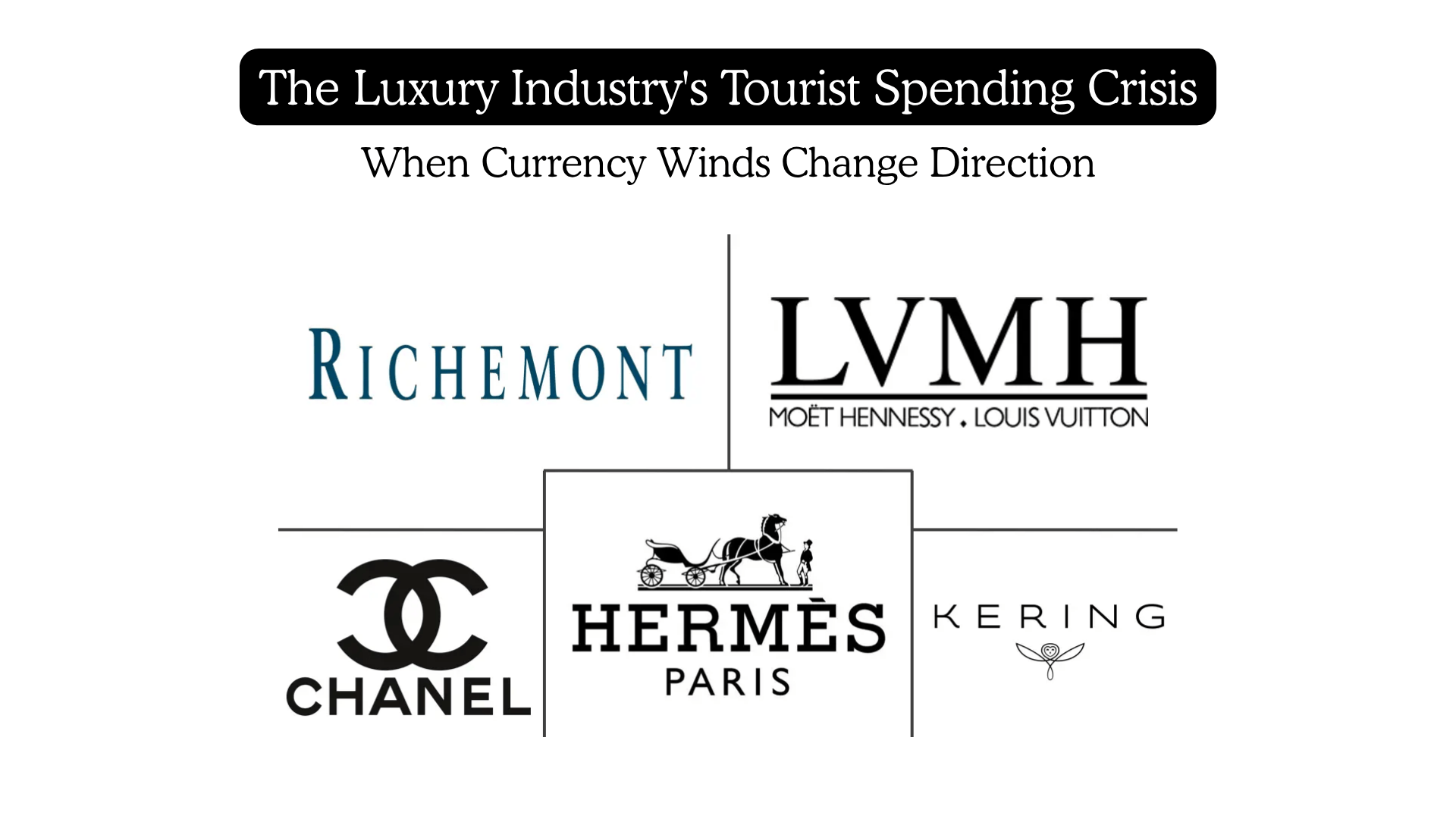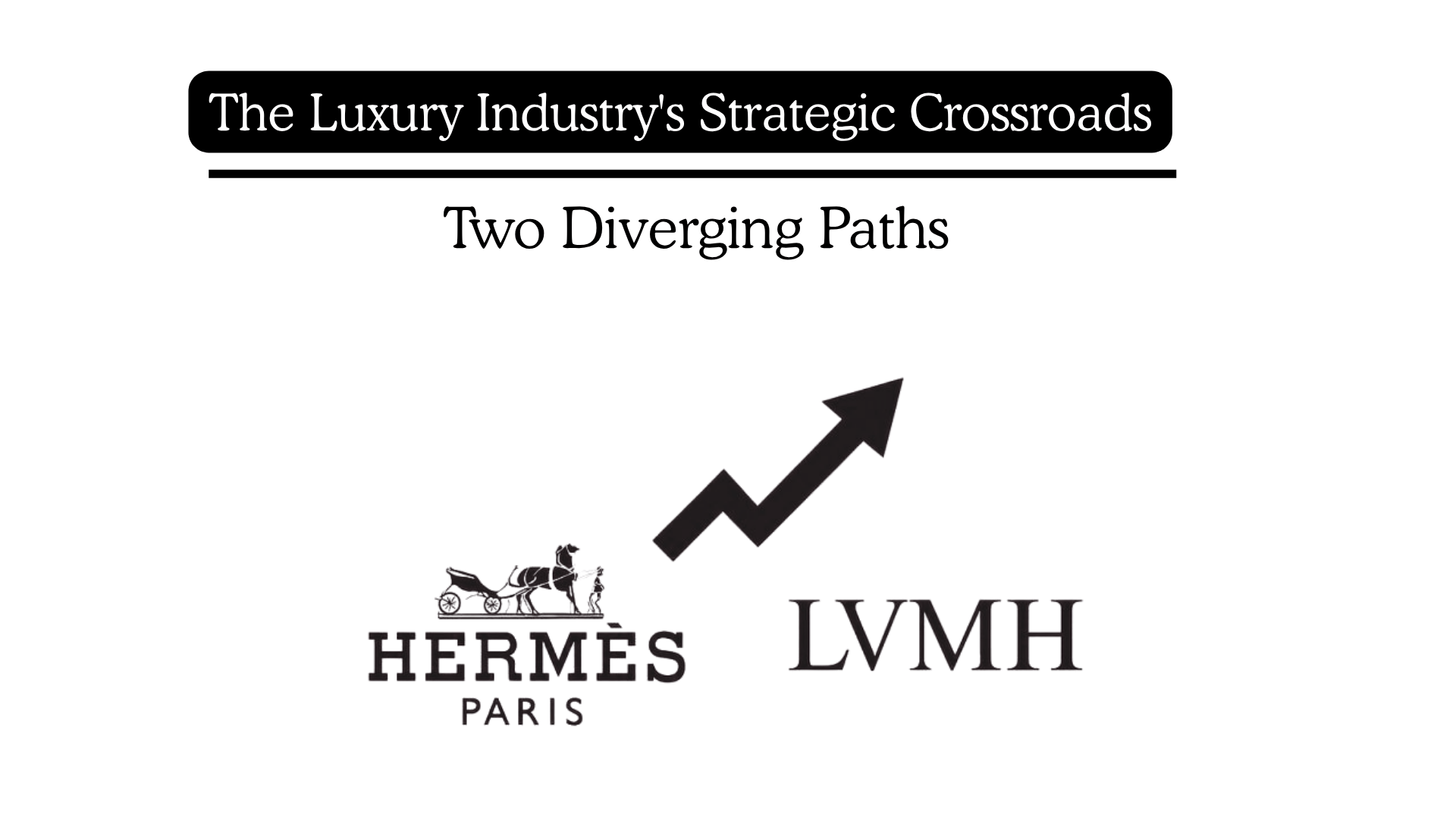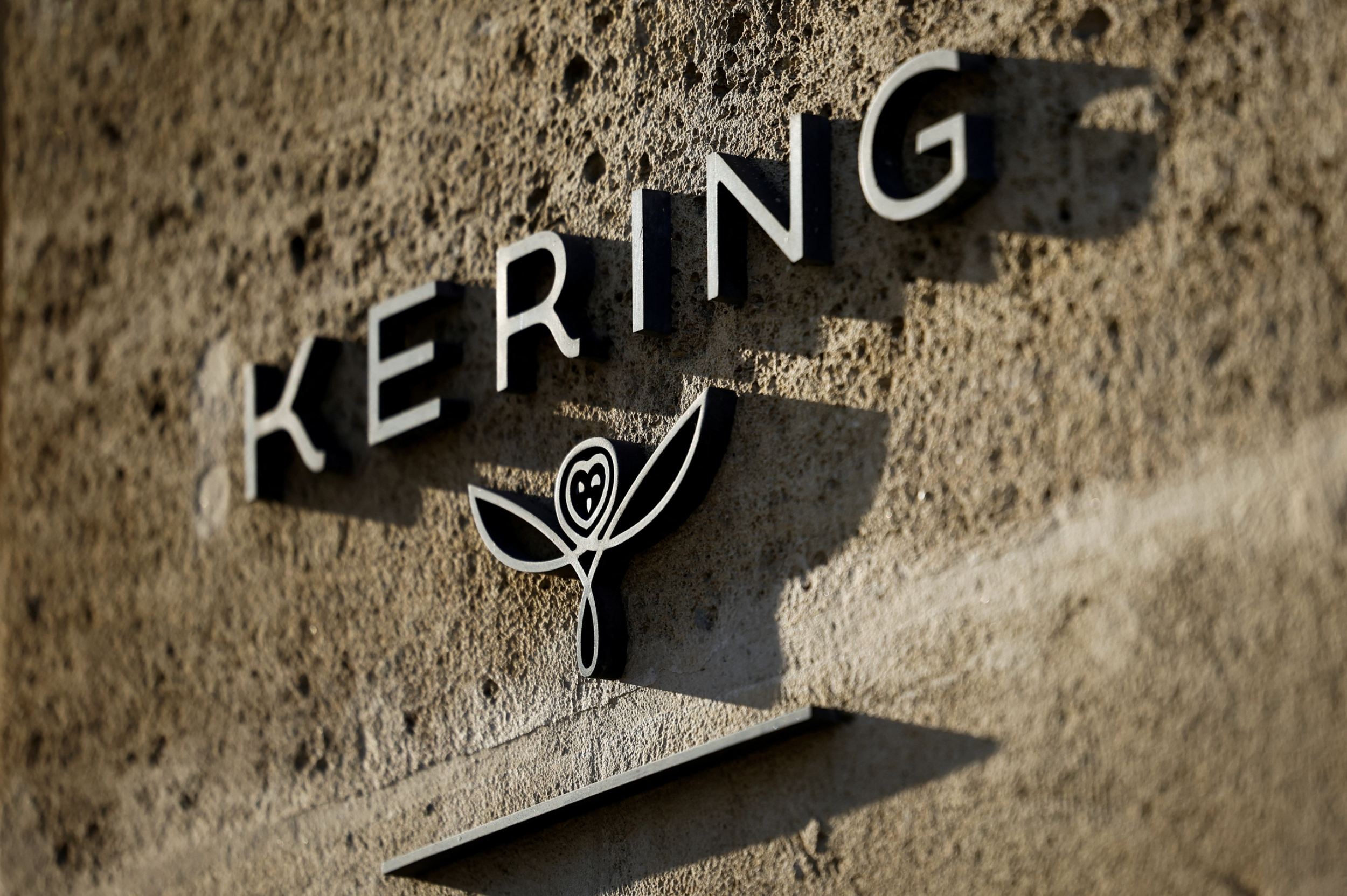
Preview | The Focused Luxury Playbook - How Exclusivity Breeds Success
In our recent exploration of the luxury industry's strategic crossroads, we examined how two contrasting approaches—LVMH's diversified conglomerate model versus Hermès' focused ultra-luxury strategy—are producing dramatically different market results. We discussed how the industry faces a fundamental choice between democratization and exclusivity, with the market increasingly rewarding focused approaches over diversified expansion. Now, fresh earnings results from Brunello Cucinelli provide compelling real-time validation of this focused luxury thesis in action.
#luxury, #brunellocucinelli, #hermes , #luxuryindustry, #luxurytrends, #luxurybusiness, #focussedluxuryplaybook, #luxurybusinessstrategy

The Luxury Industry's Tourist Spending Crisis | When Currency Winds Change Direction
The Perfect Storm Hits Luxury
Luxury brands are facing a significant downturn as tourist spending on high-end goods plummets in Europe and Japan. Currency shifts have eliminated the financial incentives that previously drove American tourists to shop in Europe and Chinese tourists to splurge in Japan. Major players like LVMH, Prada, and Moncler reported declining sales, with LVMH's fashion division dropping 9% in Q2 2025. The US dollar's 10% decline against the euro and the yen's recovery have reversed last year's boom conditions. Combined with weak consumer confidence in China and fragile demand in the US, analysts have revised 2025 luxury industry forecasts from +5% growth to -2% decline. The crisis exposes deeper issues around aggressive pricing strategies and over-dependence on currency-driven tourist spending rather than sustainable brand value.
#LuxuryIndustry, #TouristSpending, #CurrencyFluctuation, #LVMH, #Prada, #Moncler, #LuxuryBrands, #RetailCrisis, #JapanTourism, #EuropeanRetail, #ConsumerSpending, #LuxuryMarket, #FashionIndustry, #EconomicTrends, #MarketAnalysis, #RetailTrends, #LuxuryGoods, #TravelRetail, #ChinaConsumers, #USMarket, #GlobalEconomy, #BrandStrategy, #PricingStrategy, #MarketForecast, #RetailSales, #TourismEconomy, #LuxuryConsumers, #MarketVolatility, #IndustryOutlook, #RetailAnalysis

The Luxury Industry's Strategic Crossroads | Two Diverging Paths
The luxury industry faces a strategic inflection point as two contrasting approaches diverge dramatically in market performance. LVMH's diversified conglomerate model, spanning 75 brands across multiple categories, is struggling with a 4% revenue decline and 22% profit drop, while Hermès' focused ultra-luxury strategy has made it the most valuable luxury company despite generating just €15bn versus LVMH's €85bn in sales. The market is rewarding Hermès' disciplined approach to exclusivity with valuations more than twice LVMH's relative to profits.
#LuxuryStrategy, #LuxuryIndustry, #LVMH, #Hermes, #LuxuryBrands, #PremiumPositioning, #UltraLuxury, #BrandStrategy, #LuxuryConglomerate, #ExclusivityStrategy, #LuxuryMarket, #BrandPortfolio, #PricingStrategy, #MarketValuation, #LuxuryConsumers, #BrandDilution, #Democratization, #FocusStrategy, #LuxuryTrends, #IndustryTransformation, #BernardArnault, #LuxuryRetail, #PremiumBrands, #LuxuryGoods, #MarketStrategy, #BrandPositioning, #LuxuryGrowth, #StrategicFocus, #LuxuryAnalysis, #RetailStrategy, #BrandManagement, #LuxuryEcosystem

Luxury at a Crossroads | LVMH’s Slump, Price Pushback, and Arnault’s Diplomatic Gamble
The luxury slowdown just got very real.
LVMH reported a 9% drop in fashion and leather goods sales — its steepest decline in years — highlighting deepening pressure across the luxury sector. Years of aggressive price hikes, post-pandemic overexpansion, and mass-market strategies have triggered consumer fatigue. The pricing power that once fueled growth is now in retreat, with average price increases slowing to 3% in 2025.
#LVMH, #LuxuryIndustry, #BernardArnault, #LuxuryRetail, #PricingStrategy, #PostPandemicTrends, #Tariffs, #LouisVuitton, #Dior, #ConsumerTrends, #BrandDesirability, #MarketReset

Kering Eyes Fifth Avenue Sale Amid Luxury Slowdown
Kering, the luxury conglomerate that owns Gucci, is in exclusive talks to sell a majority stake in its Fifth Avenue building in New York to private equity firm Ardian. This is part of Kering’s strategy to unlock capital while maintaining flagship locations through leasebacks, as the luxury market slows down and Gucci’s sales slump. The move follows similar deals, including one in Paris earlier this year, as Kering shifts focus toward brand revival and navigates a challenging retail environment.
#LuxuryRetail, #Kering, #Ardian, #Gucci, #RealEstate, #LuxuryStrategy, #RetailTrends, #LuxuryMarket, #FifthAvenue, #InvestmentStrategy, #LuxuryBrands

2025: The Year of the Designer Renaissance in Fashion
The fashion industry is witnessing a significant shift as major brands appoint formally trained designers to lead their creative directions, moving away from marketing-centric leadership. Matthieu Blazy’s role at Chanel is emblematic of this change, marking 2025 as a pivotal year. This resurgence of designer leadership focuses on creativity and craftsmanship, aiming to deepen consumer connections and rejuvenate brand authenticity. The coming year will test whether this strategic pivot can redefine luxury fashion’s appeal and sustainability.
#FashionIndustry, #CreativeLeadership, #LuxuryFashion, #DesignerRenaissance, #MatthieuBlazy, #Chanel, #2025Trends, #FashionRevolution, #Craftsmanship, #Authenticity

Gucci’s Declining Sales Pose Challenges for Kering Amidst Chinese Market Slowdown
Kering has reported a substantial decline in sales at Gucci, with like-for-like sales dropping by 25% in the recent quarter, indicating a deeper decline than previously observed. This marks the fifth consecutive quarter of revenue decline for Gucci, which significantly impacts Kering since Gucci constitutes about half of its revenues. The downturn reflects broader challenges in the luxury sector, particularly exacerbated by weak demand in the crucial Chinese market. Amidst these challenges, Kering has installed Stefano Cantino as the new CEO of Gucci in a bid to rejuvenate the brand. Kering’s shares have also suffered, dropping more than 40% this year, as the luxury group navigates through this volatile period.
#Kering, #Gucci, #LuxuryFashion, #FashionIndustry, #MarketTrends, #ChineseMarket, #LuxuryGoods, #EconomicSlowdown, #BrandStrategy, #LeadershipChange

Luxury Brands Shift to ‘Micro’ Luxury Goods Amid Economic Downturn
Luxury brands are adapting to current economic challenges by introducing smaller, more affordable luxury goods like “super mini” handbags and wallets on chains. Aimed at middle-income shoppers, this strategic pivot seeks to recapture a crucial consumer base alienated by significant price increases over recent years. With prices of luxury goods averaging 55% higher than in 2019, these accessible items may encourage increased store traffic and sales volumes, helping brands stabilize during a widespread spending slowdown.
#LuxuryBrands, #MicroHandbags, #AffordableLuxury, #ConsumerTrends, #EconomicDownturn, #FashionIndustry, #RetailStrategy

Analyzing the Luxury and Beauty Sectors: A Cautious Outlook for 2024 and Beyond
The luxury and beauty sectors are currently navigating a challenging landscape, marked by reduced growth forecasts and evolving consumer behaviors, particularly in China. As 2024 progresses, the luxury goods market faces one of its most difficult years, with anticipated growth dropping to just 2.8%. Similarly, the beauty industry is impacted by a slowdown in Chinese economic activity and a shift towards domestic brands. Both sectors are adapting by focusing on strategic markets and innovation in products and marketing, hoping for a gradual recovery starting in 2025.
#LuxuryMarket, #BeautyIndustry, #EconomicSlowdown, #ChinaMarket, #ConsumerBehavior, #MarketAdaptation, #2025Outlook